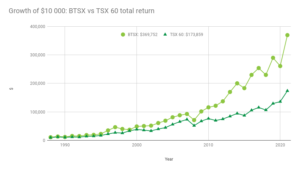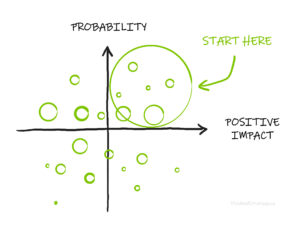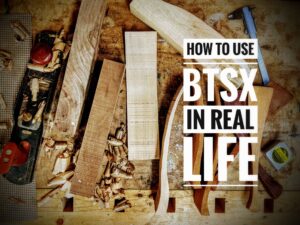Two days ago the stock market officially entered bear market territory, coming down 20% from its high just a few weeks ago. Yesterday the TSX dropped another 12% – the largest one day drop in its history. The beating investors are taking is severe. For many of us, the physical symptoms of nausea and palpitations are akin to stepping off a cliff. It’s easy to conflate the chart with impending gravitational injury.
Just because we knew this was coming doesn’t make it easy.
Compounding the financial concerns are, for many, more concrete risks of potential illness, school closures, business and employment security. These are hard times.
Making sense of market crashes
I’ve written several times about how the market will test us. Risk and volatility is the price we pay for returns that are higher (in the long run) than bonds. We can try to predict that volatility (which is usually a good way to lose money), or we can expect the wild times and plan accordingly.
What helps investors during times like these? Perspective.
If you are new to investing in the stock market and this is your first major market correction my best advice is harsh: get used to it. Market downturns are not an error of the stock market, they are a feature. Stock markets would not be capable of providing superior long term returns without this volatility. In an average investor’s lifetime, one can expect numerous corrections.
Have a look at the last 35 years of the TSX:
The recent downturn feels horrible, but, as you can see, it is far from uncommon. It hurts because it’s fresh.
When they are happening, market crashes feel like they will never end. In hindsight they feel like fleeting opportunities to buy stocks at bargain prices. Remember that.
What’s in a stock price?
It is important to remember what stock prices are. They are not objective measurements of what companies are worth. Stock prices are simply what investors are willing to pay to own a share of those companies. These prices are influenced by all kinds of factors like earnings, book value, and trends, but there is one factor that trumps all the rest: the expected future profitability of those companies.
Stock prices are built on expectations. They are dismantled by fear.
If you like math, here’s the simple equation:

When expectations grow, prices go up. When fear grows, prices go down.
Two kinds of crashes
Sometimes stock markets are hammered because of physical damage: earthquakes, floods, destruction by war, etc. Productivity and profitability are decreased because the physical capacity to produce and sell has been decreased.
More often than not, however, crashes occur because of a change in expectation. The dot com bubble burst when investors suddenly realized the insane valuations of tech companies were not warranted. The financial crisis erupted when investors clued in to the fact that real estate prices don’t march upward indefinitely and ratings of mortgage-backed securities could not be trusted. No war, no natural disaster; it was the narrative changed. The story investors told themselves shifted. Expectations lowered; fear increased.
I view this bear market similarly. Oil prices fell not because of physical destruction of infrastructure, but because expectations of future profitability are being re-framed. The coronavirus will infect and kill more people, but it seems unlikely to have a large impact on our workforce.
The world is gripped by fear, but it will pass. In its place will come adaptation, innovation, and prosperity. Another cycle. It’s what the stock market does.
The one thing you must do
The real danger to investors is not that the oil and gas industry will implode or that the world will not find a way to cope with this virus. The real danger is what we might due to ourselves.
Our financial plans are being put to the test. There is more temptation than ever to react to the headlines, sell to avoid further losses, stray from the well thought out procedures that got us this far. But once you let panic dictate your actions rather than your plan, two outcomes become much more likely: financial ruin – trading away your portfolio; or, investment aversion – refusal to invest again.
If we can accept that growth and contraction are cyclical, that market downturns – even big ones – are inevitable, we only have one important job: survive.
In order to succeed you must first survive.
Warren Buffet
Make it through this so that you can participate in the recovery. Don’t lose your head. Stick with your plan.
I will end with some more wise words from the world’s favourite investor:
. . . Widespread fear is your friend as an investor, because it serves up bargain purchases. Second, personal fear is your enemy. It will also be unwarranted. Investors who avoid high and unnecessary costs and simply sit for an extended period with a collection of large, conservatively-financed businesses will almost certainly do well.
Warren Buffet




Well put Matt.
Thanks, Sam. The struggle to understand what is happening is real for all of us. If this helps, please feel free to forward to others who might be feeling a little unhinged.
Ran a list of the TSX60 stocks to check for impact of market upheaval on the stocks.
I immediately noticed that there are 5 of the 60 stocks which have gained from year-end: SHOP, MRU, WCN, PWF, CSU.
In addition, there are 4 stocks that have lost less than 5%: L, BAM.A, FTS, TRI
Is this just a case of the current stock owners standing firm on their price and refusing to sell for a lower price or is there some other factor at play here?
Al
Hi, excellent and very positive article during this downturn. I heard a lady from Alberta on TVO (TV Ontario) in the last couple of days state the following: “during this market downturn, a lot of folks will lose a lot of money by selling stocks. On the other end, some investors will make lots of money.” That lady is also very smart and also had a very positive attitude. This is a good time to buy.
Happy to invite others to speculate. Personally, I could come up with a handful of explanations that might sound reasonable but would be completely unverifiable and, therefore, not of much utility. BNN does a great job of this.
which one of the stocks from BTSX are most likely to cut dividends, when this is done and over?
I think IPL, PPL, and BPY-UN will most likely cut dividends. I also think the market has likely already taken that into account.
Two months ago I recommended to not include BPY.UN in the BTSX. As you can see now, it’s entered the slaughter house.
Thanks, will there be a reconsideration of BTSX list in future? Avoid REITs, former income trust…only blue chips.
That is a topic for a future blog post.
I wanted to know if you are in the same camp as Ross Grant that stocks that cut their dividends should be cut (sold)?
Good question since it seems inevitable that a few BTSX stocks will be cutting their dividends.
Historically, stocks that cut their dividends perform very poorly. The problem is that by the time the cut is announced, the stock price has already taken a beating – the market has already priced in the dividend cut. Sometimes the stock price actually goes up when the cut is announced simply because it is seen as prudent business practice.
I am not aware of any evidence supporting the practice of selling when the cut is announced. Furthermore, such a strategy would require frequent checking of one’s holdings which is usually counter-productive. Lastly, it significantly complicates both the BTSX method and the performance calculations. For these reasons, I will be sticking with David Stanley’s approach of annual rebalancing, even in the face of dividend cuts.
IPL cuts diviend by 72%.
As expected, of course. Might not be the last cut as the yield is still about 6%.
Pingback: Why now is a good time to invest —